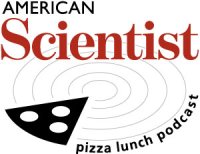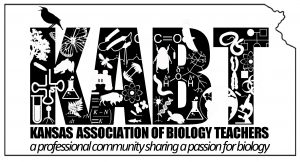American Scientist: Pizza Lunch Podcast
American Scientist Pizza Lunches are informal lectures where scientists present new research to an audience of non-scientists. The talks are hosted in Research Triangle Park, North Carolina, at the headquarters of Sigma Xi, the Scientific Research Society, the publisher of American Scientist magazine. Originally intended to help inform local science communicators about current and controversial topics, the Pizza Lunch talks are now available to anyone online, and new talks are posted periodically during the academic year.
Download individual talks through following the links below (clicking on the image above will take you to the general Pizza Lunch Podcast website).
- Whole Genome Analysis in the Clinic
James Evans, clinical researcher in genetics at the University of North Carolina
Evans urges us to support genomics medicine research but asks us to temper our enthusiasm until it becomes a proven tool. (April 20, 2010) - Genomic and Personalized Medicine
Geoffrey Ginsburg, director of the Center for Genomic Medicine, Duke University
Ginsburg presents advances and ongoing research in personalized medicine, from prescribing cancer drugs to predicting flu symptoms. (March 30, 2010) - Metapopulation Dynamics of Oyster Restoration in Pamlico Sound, NC
David Eggleston, director of the Center for Marine Science and Technology, North Carolina State University
Eggleston discusses the challenges of conserving and restoring North Carolina coastal ecosystems, particularly oyster reefs. (January 26, 2010) - An Empire Lacking Food: The Astonishing Existence of Life on the Deep Seafloor
Craig McClain, assistant director of science, National Evolutionary Synthesis Center
McClain explores how the meager availability of food on the deep seafloor shapes the ecology and evolution of the animals that live there. (December 15, 2009) - The Evolution of the Human Capacity for Killing at a Distance
Steven Churchill, professor of evolutionary anthropology, Duke University
Churchill presents his research on the evolutionary origins of projectile weaponry, and how weapon use changed interactions between humans and other species—including, perhaps, the Neandertals. (October 20, 2009) - Our Energy Future: Science and Technology Challenges for the 21st Century
Thomas Meyer, director, Solar Energy Research Center, University of North Carolina, Chapel Hill
Meyer discusses the status of the world’s energy supply. In particular, he presents the idea that the sun’s energy could be used to make fuels from water and carbon dioxide for heating, transportation and energy storage. (September 24, 2009) - Everything Is Dangerous: A Controversy
S. Stanley Young, director of bioinformatics, National Institute of Statistical Sciences
Young critiques statistical analysis by some epidemiologists, especially their multiple testing of data sets obtained from observational studies. (April 22, 2009) - From Cloning to Stem Cells: How Can Pigs Help Us Solve Problems in Human Medicine?
Jorge Piedrahita, professor of genomics, North Carolina State University College of Veterinary Medicine
Piedrahita describes his research with cloned swine and how their abnormal growth provides insight into human placental defects, the ways transgenic pigs may help grow human tissue and how pigs could help advance stem cell therapies. (March 25, 2009)
I discovered this site via a twitter link today and thought it might provide another means of bringing scientists, although virtually, into the classroom. Otherwise, if you don’t have a subscription to the American Scientist, it is one of my favorite periodicals.

